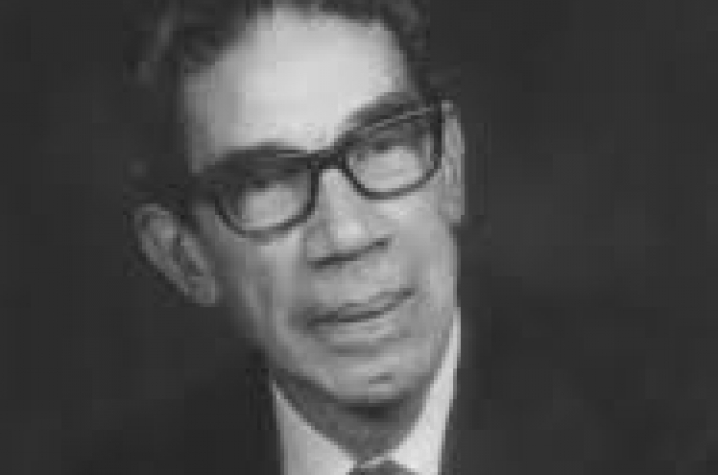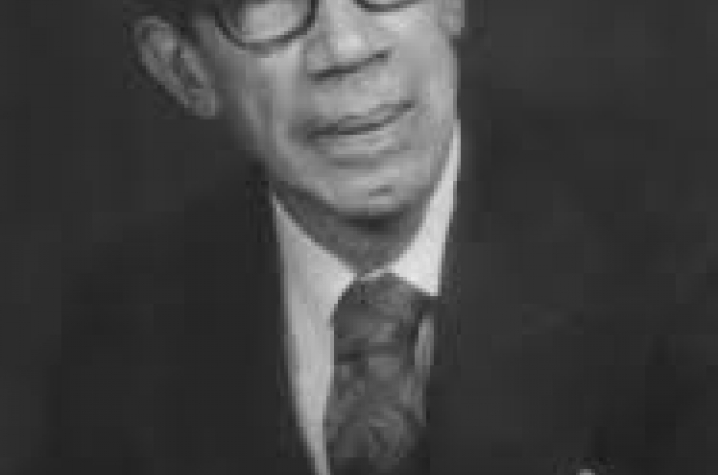UK Board Names Residence Hall for Lyman T. Johnson
LEXINGTON, Ky. (May 8, 2015) — The University of Kentucky Board of Trustees today approved the renaming of Central I residence hall in honor of Lyman T. Johnson, the late civil rights pioneer who in 1949 became the first African American to be admitted to UK as a student. The hall, built as part of the ongoing transformation of campus facilities, opened in Aug. 2013.
UK President Eli Capilouto praised the board action.
“Over the last several years our campus has focused intently on rebuilding our residential, academic, research, and health care spaces. We have undertaken this priority to build community on our campus,” Capilouto said. “But community isn’t fostered by bricks and mortar alone, it is nurtured in the stories and people who define this place. Today, because of the actions taken by our Board of Trustees, we bring greater light to one of those stories, one of those people who define this place. The new Lyman T. Johnson Hall will be both a home to countless students of myriad backgrounds and beliefs, and stand as a physical representation of an individual’s actions that forever altered the trajectory of this institution and the way we serve others.”
Rev. C.B. Akins Sr., a member of the UK Board of Trustees, thanked his fellow members and the adminstration for taking this step, "The struggle that Lyman T. Johnson went through to initiate the integration of this university is worthy of memorializing. I applaud President Capilouto and the members of this board for taking this very significant action. Others who come to UK will now have this important reminder of Mr. Johnson's legacy located in the center of campus."
Frank X Walker, UK English professor and former Kentucky poet laureate, expressed his appreciation for the board approval. "As an alum and longtime employee, I'm extra proud to be part of an institution that recognizes how Lyman T's contributions and legacy enriches us all," Walker said.
“Lyman T. Johnson deserves this recognition for his courage and willingness to challenge the blatant racism of the time," said Kahlil Baker, director of the UK Martin Luther King Center. "His challenging of the status quo is what opened the door for myself and many others to enter and move about this campus.”
Thanks to Johnson's successful suit in Federal District Court, African Americans were admitted to graduate and professional programs at UK beginning with the summer session of 1949. African Americans were admitted to the undergraduate program beginning in 1954, when the U.S. Supreme Court settled the constitutional question for Kentucky and the nation in regard to separate education for blacks and whites in Brown v. Board of Education.
A Tennessee native, Johnson, the grandson of former slaves, earned his high school diploma from the preparatory division of Knoxville College. After receiving a bachelor's degree in Greek from Virginia Union University, Johnson attained a master's degree in history from the University of Michigan. He was a member of Alpha Phi Alpha fraternity.
Johnson served in the U.S. Navy during World War II, and during the latter part of his tour of duty, helped run a school at the Great Lakes Naval Base, which enabled young and often illiterate sailors to obtain an educational foundation.
Johnson taught history, economics, and mathematics at Louisville Central High School for more than 30 years before becoming an administrator at two different schools in the Jefferson County Public Schools system, then spent three years in an administrative capacity at a Catholic high school. He also served as a member of the Jefferson County Board of Education for four years.
In 1979, Johnson received an honorary Doctor of Letters degree from UK.
Widely known as an eloquent speaker, Johnson not only opened the doors to education for thousands of minority students, he also led struggles to integrate neighborhoods, swimming pools, restaurants and other facilities. Johnson headed the Louisville chapter of the National Association for the Advancement of Colored People (NAACP) for six years.
Lyman T. Johnson died in Louisville in 1997 at the age of 91.
The request to rename the residence hall was submitted by the Lyman T. Johnson African American Alumni group and was recommended by the Advisory Committee on Naming University Property.






